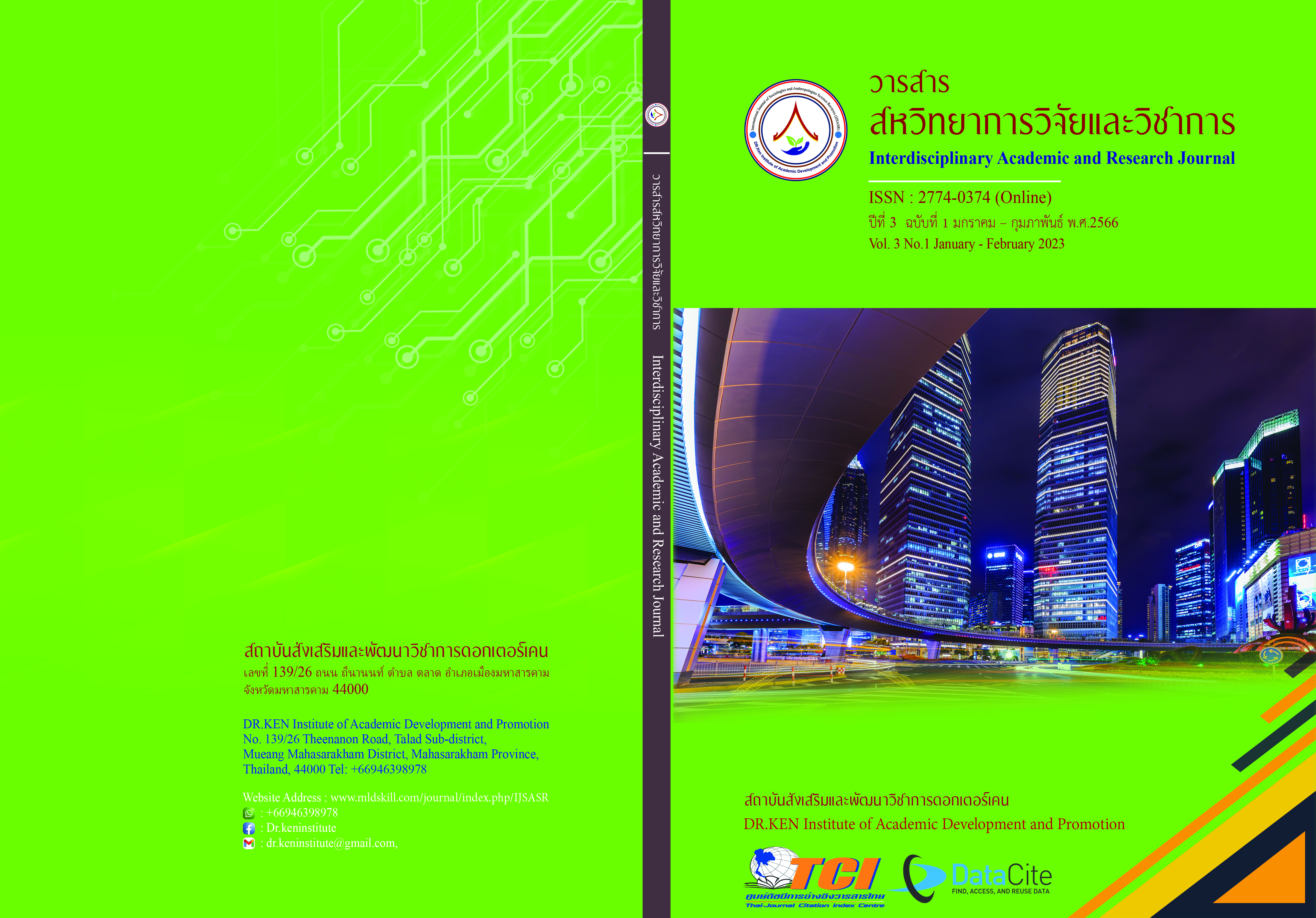Innovative Leadership of Government Educational Institution Administrators under the Office of the Vocational Education Commission Chonburi Province
DOI:
https://doi.org/10.14456/iarj.2023.29Keywords:
Leadership; , Public Educational InstitutionsAbstract
Development, innovation, and adoption are the drivers of development in all dimensions to enhance the country's potential in all areas, wherein from now on the focus will be on the adoption of creativity. Innovative leaders or school administrators must be up-to-date and keep up with the changes in society and have a perception of factual and reliable information. Innovative leadership is an important factor that causes changes in teacher development, school development, and organizational growth. Therefore, this research has an objective; (1) To study the level of innovative leadership of school administrators under the Office of the Vocational Education Commission, Chonburi Province. And (2) to compare the level of innovative leadership of school administrators under the Office of the Vocational Education Commission in Chonburi Province classified by sex, status, and work experience. The population used in the research was 916 educational institutes under the Office of Vocational Education Commission, Chonburi Province, in the academic year 2022, with 916 people, and 274 samples. The statistics used for data analysis were percentage, mean, standard deviation, t-test (Independent Samples), and F-test (One Way ANOVA). The results showed that (1) The overall opinions towards the innovative leadership of school administrators under the Office of the Vocational Education Commission, Chonburi Province were at a high level. (2) Comparison of opinions towards innovative leadership of educational institute administrators under the Office of the Vocational Education Commission in Chonburi Province as a whole, classified by sex, found that there were no differences in opinions. However, Classified by status and work experience, both overall and each aspect differed in statistical significance at the .05 level.
References
ขวัญชนก โตนาค. (2556). การวิเคราะห์องค์ประกอบภาวะผู้นำเชิงนวัตกรรมสำหรับผู้บริหารสถานศึกษาขั้นพื้นฐาน. วิทยานิพนธ์การศึกษามหาบัณฑิต: มหาวิทยาลัยนเรศวร.
จรุณี เก้าเอี้ยน. (2556) ความสัมพันธ์ระหว่างภาวะผู้นำกับการบริหารงานตามภารกิจของผู้บริหารสถานศึกษาในสามจังหวัดชายแดนภาคใต้. วารสารมหาวิทยาลัยราชภัฏยะลา. 8(1), 40-51.
จารุสิริ ทองเกตุแก้ว, เฉลิมชัย หาญกล้า และภัสยกร เลาสวัสดิกุล (2562). ภาวะผู้นำและบรรยากาศสถานศึกษาตามทัศนะของผู้บริหารสถานศึกษาและครูสังกัดสำนักงานเขตพื้นที่การศึกษาประถมศึกษาสระบุรี. วารสารลวะศรี. วารสารวิชาการมหาวิทยาลัยราชภัฏเทพสตรี. 3 (1), 63-80.
จุฑาทิพย์ ชนะเคน. (2559). การศึกษาคุณลักษณะภาวะผู้นำเชิงนวัตกรรมของผู้บริหารสถานศึกษา สังกัดสำนักงานเขตพื้นที่การศึกษาประถมศึกษาพิษณุโลก เขต 3. วิทยานิพนธ์ศึกษาศาสตรมหาบัณฑิต สาขาวิชาการบริหารการศึกษา. มหาวิทยาลัยนเรศวร.
ทิศนา แขมมณี. (2548). รูปแบบการเรียนการสอนทางเลือกที่หลากหลาย. พิมพ์ครั้งที่3. กรุงเทพฯ: จุฬาลงกรณ์มหาวิทยาลัย.
บุญชม ศรีสะอาด. (2545). การวิจัยเบื้องต้น. พิมพ์ครั้งที่ 7. กรุงเทพฯ : สุวีริยาสาส์น
ไพฑูรย์ สิลารัตน์. (2551). การเปลี่ยนผ่านการเข้าศึกษาเข้าสู่ยุคเศรษฐกิจฐานความรู้. กรุงเทพฯ: สำนักงานคณะกรรมการวิจัยแห่งชาติ.
เวียงวิวรรธน์ ทำทูล. (2557). ภาวะผู้นำเชิงนวัตกรรมของผู้บริหารที่ส่งต่อองค์การขีดสมรรถนะสูงของโรงเรียน. วิทยานิพนธ์ ศษ.ม. ขอนแก่น: มหาวิทยาลัยขอนแก่น.
สำนักงานสภาพัฒนาการเศรษฐกิจและสังคมแห่งชาติ. (2559). รายงานประจำปี 2559 สำนักงานคณะกรรมการพัฒนาการเศรษฐกิจและสังคมแห่งชาติ. กรุงเทพฯ : สำนักงานคณะกรรมการพัฒนาการเศรษฐกิจและสังคมแห่งชาติ.
อรอนงค์ โรจน์วัฒนบูลย์. (2553). การพัฒนาตัวแบบผู้นำเชิงนวัตกรรม. กรุงเทพฯ: สถาบันบัณฑิตพัฒนบริหารศาสตร์. DOI : 10.14457/NIDA.the.2010.6
Dibbon, & Pollock. (2007). The Nature of Change and Innovation in Five Innovative Schools. The Innovation Journal: The Public Sector Innovation Journal, 12(1), 1-15.
George. (2012). Innovation for inclusive growth: Towards a theoretical framework and a Research Agenda. Journal of Management Studies, 49 (4), 661-683.
Horth, D. M. & Vehar, J. (2012). Becoming a leader who fosters innovation. Baffles: Guildford & King Lynn.
Krejcie, R.V. & Morgan, D.W. (1970). Determining Sample Size for Research Activities. Journal of Education and Psychological Measurement. 30 (3), 607-610.
Richard, L. (2009). The Innovator’s Toolkit. Boston: USA.
Patel, E. (2012). The Essentials of School Leadership. London: Paul Chapman.
Tanya, R. (2010). The 7 Steps to Innovative Leadership. Retrieved July 10, 2016, from http://www.centerdigitaled.com/polity/The-7-Elemeents-of-InnovativeLeadership.html.
Downloads
Published
How to Cite
Issue
Section
License
Copyright (c) 2023 Prarinyarat Kaewyod

This work is licensed under a Creative Commons Attribution-NonCommercial-NoDerivatives 4.0 International License.
Copyright on any article in the Interdisciplinary Academic and Research Journal is retained by the author(s) under the under the Creative Commons Attribution-NonCommercial-NoDerivatives 4.0 International License. Permission to use text, content, images, etc. of publication. Any user to read, download, copy, distribute, print, search, or link to the full texts of articles, crawl them for indexing, pass them as data to software, or use them for any other lawful purpose. But do not use it for commercial use or with the intent to benefit any business.
















.png)


